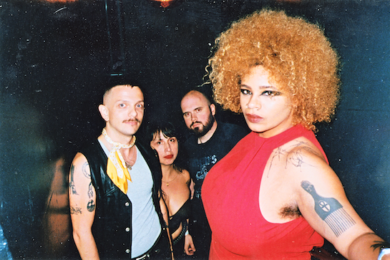Photos by Alexis Gross
“I don’t know if I set out to create songs with intense meaning. It just kind of happens,” says Special Interest frontperson Alli Logout, their voice still raspy from playing Primavera Sound in Los Angeles a few days ago. “During the time of the uprising and the quarantine era of Covid, a lot of things were on my mind about being able to move forward.”
Approaching the release of their third album Endure, the New Orleans-based punk outfit are greeting the future with their fists up. Their singular blend of dance and punk has always felt immediate and communal; intended for dark, packed warehouses where culture is pushed forward in rebellious secrecy. In these spaces, Special Interest thrive; two parts anarchy to one part erotica, performing in a flashbang of fetwear, exposed concrete and harsh light. In general they’re a band that squares up to most listeners by mere virtue of being utterly uncompromising, super fucking gay, and, to borrow a phrase from one of their songs, "Young, Gifted, Black, In Leather". They’re also a band that trades in irreverence as much as radical politics, always more concerned with showing up for their own – outsiders, in summary – than pushing for acceptance in mainstream spaces. More recently, though, they’ve been toying with a sound that wouldn’t feel out of place on Radio 1 (at night, anyway). “There’s definitely some more palatable material on this album,” Logout summarises with a laugh.
Work on Endure began in mid-2020, when the band – composed of Logout, guitarist Maria Elena, bassist Nathan Cassiani and Ruth Mascelli on synth/drum machine – found themselves in the depths of a brutally hot New Orleans summer, during a time of exceptional anger and isolation, with very little to do besides get together and play music. They responded to their constraints by doubling down on their influences, with Funkadelic-inspired vocals and dancefloor rhythms pushing some songs into house territory while their 70s glam and post-punk side took a more brutal and theatrical turn. “We were writing much moodier, darker music as well as a lot more… I hesitate to say poppy," Cassiani reflects, "But it was working out a different response to the feelings that we were having at the time."
The result sees Special Interest operating in a more dancefloor-ready register. Mykki Blanco-featuring single ‘Midnight Legend’ is all thumping bass and synths whirling like loose hair, functioning as a "love song to all the girls leaving the club at 6AM". It’s also a sombre nod to the darkness behind the glamour, namely the void-chasing behaviour we engage in when we feel lonely or isolated, and the opioid crisis that’s been ripping through at-risk communities in the States for decades. "The song is about being enabled by other people, but also by the institutions that we’re able to be ourselves in a lot," Logout explains. "I feel like everybody is quite literally silently screaming all the time, and that we don’t really know what to do or how to take care of each other. But I do think we’re learning that every day."
Elsewhere lead single ‘(Herman’s) House’ is a raucous disco ode to Herman Wallace, one of the Angola Three Black revolutionaries who were held in solitary confinement for 41 years at Louisiana State Penitentiary. During his imprisonment, Wallace worked with the artist Jackie Sumell via hundreds of letters to create his dream house down to the last detail – from the hobby shop to a skillet placed under a fire making shrimp and oyster gravy. Logout and Elena describe it as "a battle cry for dreamers who persist in spite of and because", and in practice the song bursts at the seams before it even starts, demanding to be played so loud it risks blowing the speakers and cracking the ceiling. Rave whistles and a “ooh! ooh!” go off like a Pride float full of leather daddies behind impassioned lyrics like “we’ll all be Basquiats for five minutes or Hermans for life, so when I say build I mean dream”. In October 2013 Wallace was released from prison. He died of cancer three days later.
“The link between Basquiat and Wallace is a very American link,” Logout says. “I think that just being Black in America means being exploited. Essentially Basquiat died because of the white people in his life and the pressure to be this particular kind of person. It’s two different sides of what being Black in America is. You’re either fully idolised and destroyed, or you’re thrown in a cage.”
Throughout the first half of Endure there is a dissonance between sound and subject. While most of Logout’s lyrics are heavily weighted rallying cries (though often bitterly funny), there’s an appeal to resilience through movement that sends the whole thing reeling towards transcendence. As Mascelli puts it, the music is "joyful, but still about real shit."
"[We wanted] to make people respond in a way other than just catharsis or dismay or something," they elaborate. "The last album really focused on that type of release, but joy is an important tool for gathering for the collective and for people coming together. So it felt right to make music that could facilitate that.”
The second half of the album takes a much darker turn, feeling more obviously attuned to the imminent threat of collapse that’s been a theme of Special Interest’s music since their 2018 debut Spiraling. In one interview around the time of Spiraling‘s release, Logout claims to want the “complete, total destruction of everything”. This of course was two years before the pandemic, the Black Lives Matter uprisings, the Capitol Hill riots that took place after the Presidential Election – and, more recently, Russia’s war with Ukraine and the fact that leaders across Europe are advising people to prepare for a harsh winter of financial hardship and energy blackouts. Relaying that quote back to them now, they find it quite funny.
“Maybe that’s why everyone thinks that we’re nihilistic,” they suggest, before adding that we’re definitely "on the same timeline" as we were when that interview took place. "I think that things are going to get intense, and resources are going to get intense in a way that we haven’t seen yet."

More to the point, though, Logout – who was raised in Texas by "Christian rednecks" – has a perspective on America that’s deeply informed by their experiences of extreme ideology, and of whiteness. "One of the very first things I was taught was if they ever come for our guns, or if they ever come for God and Christ and Christianity, we’re going to go blazing," they say. "I know what white America is really thinking and feeling, and it’s intense and it’s extreme. We had this LOL insurrection, the storming of the Capitol Building by all the Trumpers, and, you know, that couldn’t happen if anybody of colour was doing that. There’s so much protection for those people and those things."
We’ve been caught in a heightened state of stasis in which everything is happening and yet nothing is happening. Logout’s frustration with lack of action burns like liquid glass on the incendiary ‘Concerning Peace’, which was written immediately after the Black Lives Matter uprising and references Frantz Fanon’s 1961 book The Wretched of the Earth, with lyrics that gesture towards his thoughts on the dehumanising effects of colonisation, and violence as a force for liberation.
“These things aren’t working. Marching isn’t working. These are things that we have tried over and over again to have people see our humanity in this very particular way, approaching it with the intention of ‘well, that will surely get our message across’, aren’t working,” Logout says, matter of factly. “We’ve been in the digital era where we think that filming an incident is going to save somebody’s life, but no. That’s actually 1) getting more people killed and 2) you can have video evidence of the police actively killing somebody and they get off for it."
Spitting fire about "compromised modern activism" whose "sole purpose is individual upward mobility / And the profit off death", Logout is on furious form from start to finish, delivering – not a state of the nation, exactly, but a fuck the nation, wholeheartedly. "Who gets offered the American dream / To OD on fent / In a facist regime / Who can’t afford shit / Cause price is fucking gouged / Don’t even have a house / The landlord kicked us out," they rage in a delivery that’s part Limp Wrist part Darby Crash. "It was just a response towards that time, and that place, and also where we’re headed in a million ways,” Logout says – adding, with a smile: “I love that song."
At the end of an album of intense outbursts comes the sprawling ‘LA Blues’, an eight minute post-punk power ballad depicting summer in Louisiana. It began as an “extended instrumental dirge” that sat somewhere between classic and Krautrock, with Cassiani writing in the vein of Cabaret Voltaire and Tuxedomoon. It became more of a narrative epic when Logout added the lyrics, which describe the things going on around them in vivid detail. "It took me a second to write it lyrically. I had to be like, okay, let’s just start from the beginning," Logout says. "I was thinking about the apartment I used to live in and the people who lived under me and whatnot. Johnny really was a neighbour who was in Vietnam and who I lived above for years."
It’s a remarkable track in that it somehow forges an entirely new sound out of Special Interest’s disparate influences, from The Stooges reference in the title, to the heavy Funkadelic influence in the vocals, to Elena’s ripping guitar solo that channels Brian Eno’s ‘Baby’s On Fire’. It was one of the first songs they wrote for Endure, and remains a firm favourite for all of them. "That song just came together in this really beautiful way," Logout says. "I think we’re all very blown away by it.”
The popular saying goes that the old world is dying while the new world struggles to be born. There is a sense, now, that everything is compromised. After years of knock-backs and defeats in the face of rabid gentrification and police brutality and climate apocalypse and all the other things Special Interest gnash at in their music, anyone would be forgiven for feeling – if not at a loss, then at the very least quite tired. Though it’s plenty angry and disgusted, Endure is above all else a moment of rejuvenation. It’s a lightning rod for the feelings of being alive right now – the positive and the dogshit – and whips them up into a fever you can almost sweat out. It’s a gift to those for whom endurance and existence are the same thing.
Special Interest’s new album Endure is released on November 4 via Rough Trade




